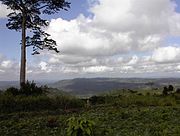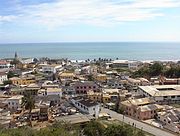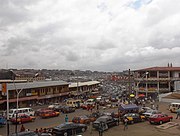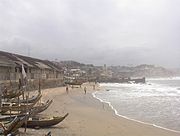Ghana
From Wikipedia, the free encyclopedia.
- For other uses, see Ghana (disambiguation).
The Republic of Ghana is a nation in West Africa. It borders Côte d'Ivoire to the west, Burkina Faso in the north, Togo to the east, with the Gulf of Guinea on its southern coastline. Formerly the Gold Coast, the name Ghana is derived from the Ghana Empire (although its territory never reached present-day Ghana).
|
|||||
| National motto: Freedom and Justice | |||||
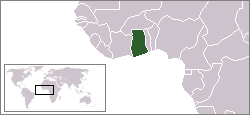 |
|||||
| Official language | English (official), Twi, Ewe, Dagbani, others | ||||
| Capital and largest city | Accra | ||||
| Capital's coordinates | 5°33′ N 0°15′ W | ||||
| President | John Agyekum Kufuor | ||||
| Area - Total - % water |
Ranked 78th 238,540 km² 3.5% |
||||
| Population
|
Ranked 50th
|
||||
| GDP (PPP)
|
Ranked 73rd
|
||||
| Currency | Cedi | ||||
| Time zone | UTC, no (DST) | ||||
| Independence | 6 March 1957, from the United Kingdom | ||||
| National anthem | "Hail the Name of Ghana" | ||||
| Internet TLD | .gh | ||||
| Calling Code | 233 | ||||
Contents |
Name
Upon achieving independence from the United Kingdom, the name "Ghana" was chosen for the new nation—a reference to the Ghana Empire of earlier centuries. This name is mostly symbolic, as the ancient Empire of Ghana was located to the north and west of current-day Ghana. The name was adopted as a reference to the descendants of the ancient Empire of Ghana who migrated south and east and currently reside in Ghana.
History
Main article: History of Ghana
Ghana was formed from the merger of the British colony of the Gold Coast and the British Togoland trust territory. In 1957 Ghana became one of the first European colonies in black Africa to gain its independence (a few other sub-Saharan countries had by then already achieved their independence: Liberia, which was not a former European colony, and Ethiopia, which was seen as an ancient nation liberated from occupation rather than a colony that turned into a new state. Also, Sudan was considered an Arab dominated country, while South Africa was seen as a country run entirely by "whites"). A long series of coups after Kwame Nkrumah, the first Ghanaian president, was overthrown, resulted in the suspension of the constitution in 1981 and the banning of political parties. A new constitution, restoring multiparty politics, was approved in 1992.
Politics
Main article: Politics of Ghana
Ghana is a republic within the Commonwealth of Nations. Its head of state is an elected president (currently John Agyekum Kufuor) with executive power. The Parliament of Ghana is unicameral and dominated by two main parties, the New Patriotic Party and National Democratic Congress. Kofi Annan, the current Secretary-General of the United Nations, is from Ghana.
Economy
Main article: Economy of Ghana
Well endowed with natural resources, Ghana has twice the per capita output of the poorer countries in West Africa. Even so, Ghana remains heavily dependent on international financial and technical assistance. Gold, timber, and cocoa production are major sources of foreign exchange.
Regions
Main article: Regions of Ghana
Ghana is divided into 10 regions:
Geography
Main article: Geography of Ghana
Ghana is located on the Gulf of Guinea, only a few degrees north of the Equator. The coastline is mostly a low, sandy shore backed by plains and scrub and intersected by several rivers and streams. A tropical rain forest belt, broken by heavily forested hills and many streams and rivers, extends northward from the shore. North of this belt, the land is covered by low bush, park-like savanna, and grassy plains.
The climate is tropical. The eastern coastal belt is warm and comparatively dry (see Dahomey Gap); the southwest corner, hot and humid; and the north, hot and dry. Lake Volta, the largest man-made lake in the world, extends through large portions of eastern Ghana.
The capital is Accra.
Main cities
Other cities include (see also Cities in Ghana):
- Asamankese
- Bolgatanga
- Cape Coast
- Elmina
- Ho
- Kumasi - (Rail junction)
- Nsawam - (Rail junction)
- Takoradi - port - railhead
- Tamale
- Tarkwa - (rail junction)
- Tema - port - railhead (??)
Culture
Main article: Culture of Ghana
Perhaps the most visible (and most marketable) cultural contribution from modern Ghana is Kente cloth, which is widely recognized and valued for its colors and symbolism. Kente cloth is made by skilled Ghanaian weavers, and the major weaving centers in and around Kumasi (Bonwire is known as the home of Kente, though areas of Volta Region also lay claim to the title) are full of weavers throwing their shuttles back and forth as they make long strips of Kente. These strips can then be sewn together to form the larger wraps which are worn by some Ghanaians (chiefs especially) and are purchased by tourists in Accra and Kumasi. The colors and patterns of the Kente are carefully chosen by the weaver and the wearer. Each symbol woven into the cloth has a special meaning within the Akan tribe of Ghana. The Akan Tribe is spit into two man parts, those who speak Fante and the Twii speekers. The languages are similar yet are distinguishable by accents and the use of certain different words for the same objects.
Kente is one of the symbols of the Akan chieftaincy, which remains strong throughout the country, particularly in the areas populated by members of the culturally- and politically-dominant Ashanti tribe. The Ashanti's chief, known as the Asantehene, is perhaps the most revered individual in the central part of the country. Like other Ghanaian chiefs, he wears bright Kente, gold bracelets, rings and amulets, and is always accompanied by numerous ornate umbrellas (which are also a symbol of the chieftaincy itself). The most sacred symbol of the Ashanti people is the Golden Stool, a small golden throne in which the spirit of the people is said to reside. It is kept in safekeeping in Kumasi, the cultural capital of the Ashanti people and the seat of the Asantehene's palace. Though the chieftaincy across Ghana has been weakened by allegations of corruption and cooperation with colonial oppression, it remains a very vital institution in Ghana.
After Independence, the Ghanaian music scene flourished, particularly the up-tempo, danceable style known as high life, which is still played consistently at the local clubs and bars, often called spots. Many Ghanaians are adept drummers, and it is not unusual to hear traditional drum ensembles play at social events or performances.
The worldwide passion for football has not escaped Ghana, and a jubilant nation watched as the "Black Stars" qualified for the 2006 FIFA World Cup. The team booked its tickets to Germany with a 4-0 win over the Cape Verde Islands on October 8, 2005. This marks Ghana's first appearance on football's grandest stage.
Emmanuel Ofosu Yeboah recently completed a 400 mile journey across Ghana on a bicycle. An impressive feat in and of itself, Yeboah's accomplishment attracted international attention; he reached his goal despite having only one leg. An American foundation heard of his perseverance and paid for a $75,000 surgery for a prosthetic leg.
Education
Ghana has 12,130 primary schools, 5,450 junior secondary schools, 503 senior secondary schools, 21 training colleges, 18 technical institutions, two diploma-awarding institutions and five universities serving a population of 17 million; this means that most Ghanaians have relatively easy access to good education. In contrast, at the time of independence in 1957, Ghana had only one university and a handful of secondary and primary schools. In the past decade, Ghanaís spending on education has been between 28 percent and 40 percent of its annual budget.
Primary and middle school education is provided as a public service‚ and will be mandatory when enough teachers and facilities are available to accommodate all the students. Students begin their 6-year primary education at age six. Under educational reforms implemented in 1987, they pass into a new junior secondary school system for 3 years of academic training combined with technical and vocational training.
Those continuing move into the 3-year senior secondary school program. Entrance to universities is by examination following completion of senior secondary school. School enrolment totals almost 2 million: 1.3 million primary; 107,600 secondary; 489,00 middle; 21,280 technical; 11,300 teacher training; and 5,600 university.
Educational reform is currently on-going in Ghana.
Education is mainly in English.
Miscellaneous topics
- Communications in Ghana
- Demographics of Ghana
- Foreign relations of Ghana
- Islam in Ghana
- List of Ghanian companies
- List of writers from Ghana
- Military of Ghana
- Music of Ghana
- Public Holidays in Ghana
- Transportation in Ghana
External links
Government
- The Republic of Ghana official government site
- The Parliament of Ghana official site
News
- Accra Daily Mail daily newspaper
- afrol News - Ghana independent news agency
- AllAfrica.com - Ghana news headline links
- Ghana Review International UK-based daily
- The Daily Graphic daily newspaper
- The Ghanaian Chronicle daily newspaper
- Ghana For All Ghana For All
Overviews
- BBC News Country Profile - Ghana
- CIA World Factbook - Ghana
- Library of Congress Country Study - Ghana data as of November 1994
Directories
- Columbia University Libraries - African Studies: Ghana directory category
- LookSmart - Ghana directory category
- Open Directory Project - Ghana directory category
- Stanford University - Africa South of the Sahara: Ghana directory category
- Yahoo! - Ghana directory category
Tourism
- Ghana: A golden experience at the center of the world official government tourism site
- Ghana International Airlines The New National Carrier of Ghana
- Ghana Association of Travel & Tourist Agents Ghana Association of Travel & Tourist Agents
- African Destinations African Destinations
- Ramel Travel & Tours Ramel Travel & Tours
Other
- GhanaWeb portal
- GhanaKeyboards Free Downloadable Keyboards for Ghanaian Languages
- Ghana Music.com Current music news - content updated daily
- Ghana Music News Ghana music news
| Countries in Africa | ||
|
Algeria | Angola | Benin | Botswana | Burkina Faso | Burundi | Cameroon | Cape Verde | Central African Republic | Chad | Comoros | Democratic Republic of the Congo | Republic of the Congo | Côte d'Ivoire | Djibouti | Egypt | Equatorial Guinea | Eritrea | Ethiopia | Gabon | The Gambia | Ghana | Guinea | Guinea-Bissau | Kenya | Lesotho | Liberia | Libya | Madagascar | Malawi | Mali | Mauritania | Mauritius | Morocco | Mozambique | Namibia | Niger | Nigeria | Rwanda | São Tomé and Príncipe | Senegal | Seychelles | Sierra Leone | Somalia/Somaliland | South Africa | Sudan | Swaziland | Tanzania | Togo | Tunisia | Uganda | Western Sahara/SADR | Zambia | Zimbabwe |
||
| Dependencies: British Indian Ocean Territory | Canary Islands | Ceuta and Melilla | Madeira Islands | Mayotte | Réunion | Saint Helena and dependencies | ||




